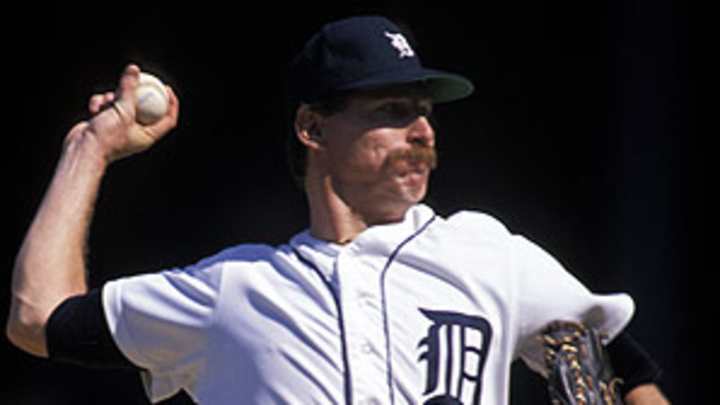Morris on rising Hall of Fame vote total: 'A good day for me'


A week ago, pitcher Jack Morris was tired of talking about the baseball Hall of Fame. He was grateful to be on the ballot, but, after 12 years with a vote total that seemed to be going nowhere, he didn't know what else to say about his candidacy.
Monday, though, was a different story.
Five minutes after the announcement that shortstop Barry Larkin was the newest member of the Hall of Fame, Morris, at home in St. Paul, Minn., had energy in his voice. He was happy that Larkin was going to Cooperstown and optimistic that his vote total took a dramatic jump of 14 points to 67 percent.
"This is Barry Larkin's day, and it is a great time for him,'' Morris said in an interview with SI.com. "I congratulate him because he is a deserving player. He played with integrity and class, and this is a great time for him.
"But I made progress on the ballot, and today was a good day for me. I can't see it any other way. I wanted to at least acknowledge the writers that reconsidered my career and gave me a vote.''
Morris' percentage in balloting by the Baseball Writers Association of America jumped from 53.5 percent last year to 66.7 percent this year, getting checked on 382 of 573 BBWAA ballots. He needs 75 percent to for election.
Now, the question is whether Morris, 56, with two years of eligibility remaining, can build on the momentum of a ballot that was considered weak this time around. Next year, players such as Craig Biggio, Curt Schilling, Mike Piazza, Roger Clemens, Barry Bonds and Sammy Sosa will appear on the ballot. The year after that -- Morris' final year on the ballot -- the newcomers include pitchers Tom Glavine, Greg Maddux and Mike Mussina.
Glavine won 305 games and led the National League in starts six times and wins five times. Maddux is a four-time Cy Young Award winner with 355 victories. Mussina had 270 wins.
Morris is as cautious as he is optimistic, even though since 1936, when the BBWAA started voting for the Hall of Fame, first baseman Gil Hodges is the only player to receive at least 50 percent of the vote and not reach Cooperstown.
Morris says he's not going to make any predictions because he knows what happened to another pitcher, Jim Bunning.
Bunning, who won 224 games with a 3.27 ERA during his career, which included nine seasons with the Detroit Tigers and six with the Philadelphia Phillies, received 74.2 percent of the BBWAA vote in 1988, his 12th season on the ballot.
But, the following year, a group of newcomers on the ballot, including Carl Yastrzemski, Johnny Bench, Ferguson Jenkins, Gaylord Perry and Jim Kaat, Bunning's vote total dropped in each of the next two seasons.
Bunning didn't get the required 75 percent of the vote, and he didn't make Cooperstown until the Veterans Committee elected him in 1996.
BBWAA members can vote for up to 10 players on each ballot. However, writers seldom check 10 names each year.
"That's why I'm not making any predictions, because I know that what happened to Jim Bunning,'' Morris said. "He actually lost ground.''
Paul Hagen, a voter from the Philadelphia Daily News, says that in most years, Morris' vote total would be a sign that he would get over the hump, like pitcher Bert Blyleven, who was elected last year in his 14th year of eligibility. Hagen said voters look extra close at players that are finishing their eligibility, just to make sure they don't leave a player off that deserves to be in.
"But this is an unusual case, not just because of the pitchers, but because of the position players that are coming up in the next couple of years,'' Hagen says. "A writer can vote for up to 10, but most don't want to vote for that many players.''
Morris pitched 18 seasons and won 254 games. He retired after the 1994 season, and his vote total has risen slowly and steadily since. His 162 wins were the most in the 1980s. He also led the decade with 133 complete games and 2,443 2/3 innings.
But, if elected, his 3.90 ERA would be the highest for a Hall of Fame pitcher.
On the other hand, every pitcher who has a previous decade in wins in the 20th century and is eligible is in Cooperstown, including Jim Palmer, Juan Marichal, Warren Spahn, Hal Newhouser, Lefty Grove, Burleigh Grimes, Walter Johnson and Christy Mathewson.
Morris, though, has a lot of strong support, but also plenty of opposition, especially voters who focus on statistics. His career numbers work against him, but his reputation as an elite staff ace that knew how to win big games is his best advocacy.
Morris was on World Series championship teams in Detroit, Minnesota and Toronto. He had a 2.96 ERA in 52 2/3 World Series innings. He pitched two complete games for the Tigers in the 1984 World Series vs. the San Diego Padres, and pitched 10 shutout innings in a 1-0 win for the Minnesota Twins in Game 7 of the 1991 World Series.
Morris, who is a broadcaster for the Twins, along with Hall of Famer Bert Blyleven, spent Monday at home in St. Paul, Minn. He was going to go ice fishing, but the unseasonably warm weather had all the ice melting.
"So I sat around and waited. I watched the announcement. I saw the totals and accepted it. There's nothing I can do about it. It's out of my control. I'm grateful my total went up. But I'm not going to plead my case or justify my accomplishments. I appreciate those who vote for me, but I know that are voters who don't. That's the nature of the beast. That's baseball and the system we are using.''
